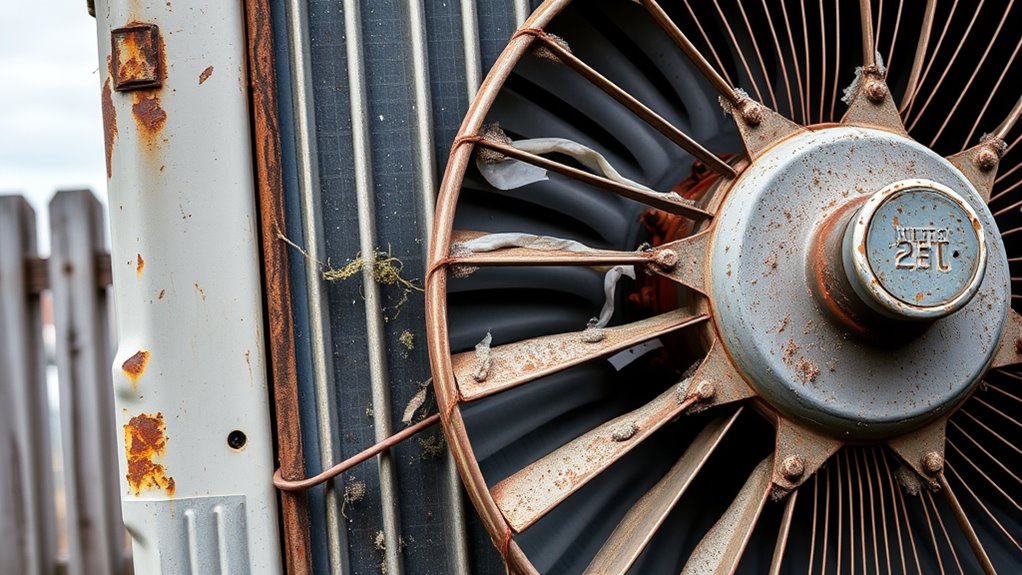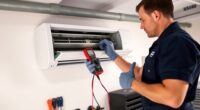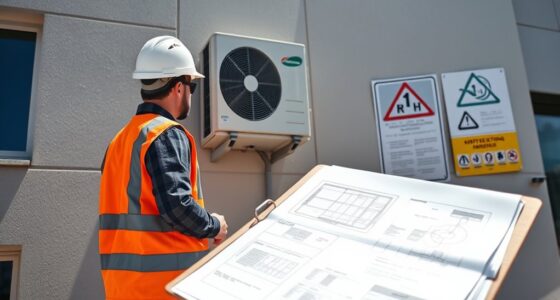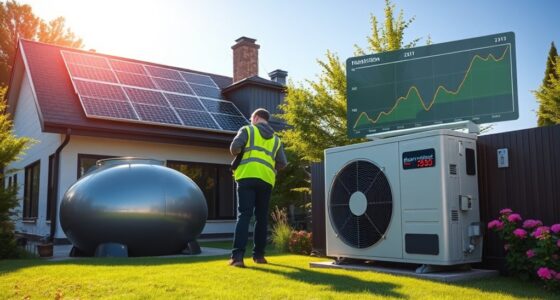If your heat pump is over 10-15 years old, it’s likely nearing the end of its lifespan. Signs you should consider replacement include rising energy bills despite consistent use, frequent repairs, inconsistent heating or cooling, strange noises, or increased indoor humidity. Older units often lose efficiency and support for newer refrigerants or smart controls. Recognizing these signs early can help you avoid costly breakdowns—discover more about how to identify these issues below.
Key Takeaways
- Energy bills rise despite consistent use due to reduced efficiency of aging units.
- Frequent repairs and increasing costs suggest it’s time for a replacement.
- Heat pumps over 10-15 years old tend to be less reliable and less efficient.
- Signs like inconsistent temperatures or strange noises indicate worn-out components.
- Proactively replacing before breakdowns ensures continued comfort and saves money.
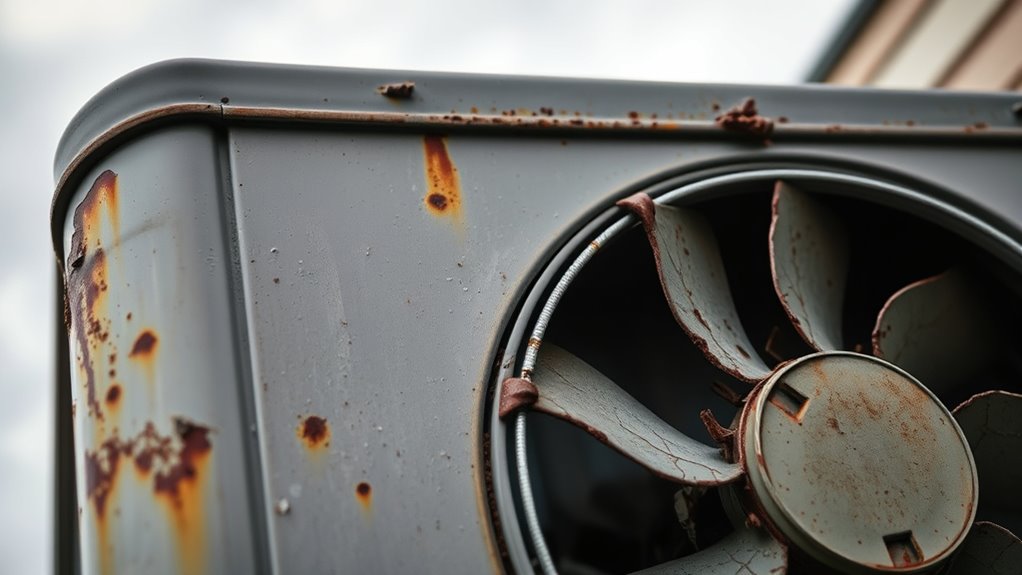
Knowing when to replace your heat pump can save you money and prevent unexpected breakdowns. As your equipment ages, it becomes less efficient, which can lead to higher energy bills and reduced comfort. Recognizing the signs of an aging heat pump allows you to plan ahead, ensuring you don’t get caught off guard during the coldest or hottest months.
Replacing your aging heat pump saves money and avoids unexpected breakdowns during extreme weather.
One of the clearest indicators that it’s time for a replacement is a noticeable decline in energy efficiency. If your energy bills have been steadily climbing despite no changes in usage, your heat pump might be working harder than necessary. Older units tend to lose their ability to transfer heat effectively, forcing your system to consume more power to maintain your desired temperature. Upgrading to a newer, more efficient model can considerably cut your energy costs and lower your monthly bills, providing substantial cost savings over time.
Another sign to watch for is frequent or costly repairs. If you find yourself repeatedly calling for repairs, it’s a red flag that your heat pump is nearing the end of its lifespan. Continual breakdowns or minor fixes can quickly add up, making replacement more economical in the long run. Besides, older equipment may not be compatible with newer, more efficient refrigerants or compatible with advanced thermostat controls, limiting your ability to optimize energy usage. When repair costs surpass a significant percentage of the price of a new unit, replacing your heat pump becomes a wise financial decision.
You should also consider the age of your heat pump. Most units last around 10 to 15 years with proper maintenance. If your system is approaching or has exceeded this age range, it’s likely less reliable and less efficient than modern models. Even with routine servicing, aging components degrade over time, leading to diminished performance. If your system is over a decade old, investing in a new one could deliver better energy efficiency, improved comfort, and the peace of mind that comes with modern technology.
Furthermore, inconsistent heating or cooling, strange noises, and increased humidity levels are signs that your heat pump is struggling. These issues often stem from worn-out parts or declining performance, which can’t be fully addressed through repairs. All these symptoms point toward the need for a replacement to restore your home’s comfort and efficiency.
Additionally, understanding the typical lifespan of heat pumps helps in planning for replacement before costly failures occur.
Frequently Asked Questions
How Long Does a Typical Heat Pump Last?
A typical heat pump lasts about 10 to 15 years, but its lifespan depends on regular heat pump maintenance and usage. You can extend its life by scheduling annual inspections, keeping the filters clean, and addressing issues promptly. Factors like climate, installation quality, and how often you use it also impact longevity. Staying proactive with maintenance helps maximize performance and delays the need for replacement.
Can Repairs Extend My Heat Pump’s Lifespan?
Imagine your heat pump as a trusty vehicle; repairs can keep it running smoothly for a while, but only if you follow proper maintenance tips. Regular filter changes and professional tune-ups can extend its lifespan. While brand comparisons matter, ultimately, timely repairs prevent small issues from turning into costly replacements. Keep a close eye on performance, and don’t hesitate to consult a pro for advice on repairs versus upgrades.
What Are the Costs Associated With Replacing a Heat Pump?
Replacing your heat pump costs vary depending on the unit size, efficiency, and installation complexity. Expect installation costs to range from $3,000 to $8,000, which includes equipment and labor. To ease the financial burden, explore financing options like loans or payment plans. These can make upgrading more manageable, helping you enjoy improved energy efficiency and comfort without a large upfront expense.
Is It Better to Repair or Replace an Aging Heat Pump?
Deciding whether to repair or replace your aging heat pump is like choosing between patching a leaky boat or getting a new one. If the cost comparison shows frequent repairs, replacing often saves money. Plus, newer models are more energy-efficient, reducing environmental impact. If your heat pump is over 10-15 years old and repairs are piling up, it’s smarter to replace and enjoy lower bills and a greener footprint.
How Energy-Efficient Are New Heat Pump Models?
New heat pump models are highly energy-efficient, often saving you money on utility bills. They feature advanced refrigerant systems that improve refrigerant efficiency, reducing energy waste. Pairing your new heat pump with a smart thermostat maximizes these savings by optimizing operation based on your schedule and preferences. Overall, upgrading guarantees better performance, lower energy consumption, and increased comfort, making it a smart choice for energy-conscious homeowners.
Conclusion
Knowing when to replace your heat pump can save you money and prevent discomfort. If your system is over 10-15 years old or requires frequent repairs, it’s time to contemplate a replacement. Did you know that replacing an aging heat pump can improve energy efficiency by up to 50%? Staying alert to signs of wear ensures you stay warm and save on energy costs. Don’t wait until your system fails—act early for better comfort and savings.
